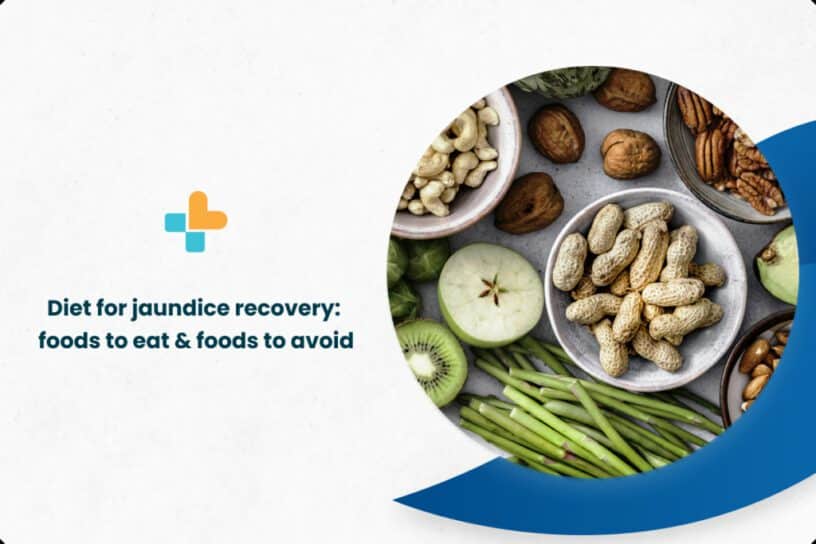If you ever notice yellowish discolouration on the skin and whites of a person’s eyes, then you must know that it is jaundice. Although jaundice may be a common condition, it often is a symptom of an underlying problem in the liver. Hence, it is vital not to ignore the signs and symptoms of jaundice and get it diagnosed and treated on time. Apart from timely treatment, the jaundice diet taken by the patient also plays an important role in the speedy recovery of the patient.
This blog highlights the importance of a jaundice diet. So please keep reading.
What is Jaundice?
Jaundice is a condition that arises when there is a high build-up of bilirubin in the blood. This accumulation of bilirubin (a yellowish-orange pigment) leads to yellowish discoloration on the patient’s skin and the white portion of the eyes.
Apart from yellowish discoloration, some other symptoms are seen in patients having jaundice, including,
- Fever
- Dark colored urine
- Clay, or pale-colored faeces
There are various causes of jaundice, and the treatment of jaundice usually aims at treating its cause. Some of the causes of jaundice include:
- Viral infections
- Liver inflammation
- usage of some medicines
- Liver cancer
- Liver cirrhosis
What Is The importance of a Diet In Jaundice Recovery?
It is a popular saying that we are what we eat. Diet plays a huge part in the treatment and recovery of almost every condition. Similarly, a jaundice diet is highly essential for a jaundice patient. Eating a healthy diet is not only important to improve the symptoms of jaundice and recover quickly, but also to maintain the overall health of the liver in general.
So, what is an ideal jaundice diet, and what are the foods to eat and avoid during jaundice? Let’s find out.
What Your Diet Should Include
A jaundice diet must include foods that are easy to digest and don’t work up the liver a lot. At this point, the liver is still recovering. The diet for jaundice patients usually differs from one patient to another, depending upon the underlying cause. Hence, it is best to get a jaundice diet prescribed by a doctor. However, in general, a jaundice diet can include the following foods:
1. Water:
Hydration is highly essential when it comes to recovering from jaundice. It is advised to drink at least 2 litres of water a day. Water not only helps the patient stay hydrated but also helps the liver in working better and get rid of any toxins present. Hydration can also be made interesting by adding lemon and mint leaves to the water. Apart from that, coconut water can also be consumed for extra hydration.
2. Fruits and vegetables:
Loaded with nutrients, fruits and vegetables are a vital part of a jaundice diet. Fruits and vegetables are packed with the goodness of our nutrients like antioxidants, fiber, phytochemicals, vitamins, and minerals that aid in digestion, help the liver, and promote overall health. Some fruits and vegetables in a jaundice diet include blueberries, tomatoes, carrots, spinach, cruciferous vegetables, etc.
3. Nuts and legumes:
Nuts contain omega-3 fatty acids, whereas, legumes have vitamin E, phenolic acids, and antioxidants present in abundance. Hence, adding nuts and legumes to the jaundice diet helps improve liver function.
4. Coffee or tea:
Consuming coffee and herbal teas have been found to improve digestion. Studies have found that coffee and green tea promote liver health. Additionally, drinking around 1 to 3 cups of coffee in a day may help in slowing down conditions like liver cirrhosis, non-alcoholic fatty liver disease, fibrosis, cancer, and Hepatitis B and C, which are known causes of Jaundice.
5. Fibre:
Including fiber in a jaundice diet is essential, specifically soluble fiber. Fibre is beneficial in helping the liver function properly. Fibre also helps in the absorption and removal of bilirubin, thereby preventing its accumulation which can cause jaundice.
6. Whole grains:
Packed with healthy fats, antioxidants, and fiber, whole grains make for a very important part of a jaundice diet.
7. Dietary supplements:
After a complete examination of the patient’s health, the healthcare provider may also prescribe dietary supplements to help the patient in getting better and improve the health of the liver.
What Foods Should You Avoid During Jaundice
There are certain foods that, when consumed, can cause liver problems or further worsen an already existing liver condition. These foods include the following,
1. Alcohol:
Consumption of alcohol must be completely avoided for good liver health. People having liver conditions must strictly avoid drinking alcohol as it will worsen the liver condition and cause more damage, thereby interfering with its healing process.
2. Salt:
Although salt is a common kitchen ingredient, its use in a jaundice diet has to be limited. This is because salt contains sodium which can cause water retention and hamper liver function.
3. Beef and Pork:
Rich in amino acids, beef and pork are a big no in a jaundice diet. This is because they are difficult to digest and will require the damaged or healing liver to work more.
4. Sugar:
Another popular kitchen ingredient, sugar’s effect on the health needs no introduction. Sugar is to be avoided in jaundice patients as it has been associated with conditions like diabetes and obesity that may further damage the liver. Sugar may also cause deposition of fats in the liver.
5. Saturated and Trans Fats:
These are foods that are fried, spicy, and greasy, making their digestion difficult. Eating saturated and trans fats not only increases the burden on the liver to facilitate digestion but also puts a person at risk of developing obesity which can cause further liver problems. Hence, the intake of these foods must be limited.
6. Raw or Undercooked Fish or Shellfish:
When not cooked properly, toxins that may be present in the fish can cause harm to the liver. This harm may also be caused by the microorganisms that may be present in the raw fish.
Tips and Tricks For Healthy Eating
Eating healthy is a choice we all get. How and what you eat are equally important for maintaining and promoting good overall health. Eating healthily is highly essential, especially when having diseases like jaundice. You can indulge in the practice of healthy eating by getting a diet plan prescribed for you by a dietician. Apart from that, there are certain tips that you can follow for healthy eating. These tips include,
- Eating slowly and chewing properly
- Splitting the meals, you eat throughout the day into 4-6 small meals, rather than 3 big meals
- Drinking lots of water and fluids
- Reducing salt and sugar intake
- Cooking meals properly
- Avoiding the consumption of alcohol, sodas, and other beverages
Conclusion
Jaundice is a serious problem. Even though the treatment works towards treating its cause, a jaundice diet is equally essential to recover at the earliest. Following a healthy lifestyle doesn’t only contribute to good liver health but improves overall body functions as well. While a jaundice diet helps in the patient’s speedy recovery, it is also important to consult a doctor before hopping onto any diet, as your doctor or dietician will prescribe you a jaundice diet after thoroughly examining your overall health.
If you need additional information or would like to speak with a professional, feel free to contact us right away at +91 636-610-0800 or book an appointment on our website.
References:
https://www.healthline.com/health/food-nutrition/diet-for-jaundice#tips-for-healthy-eating
https://www.medicalnewstoday.com/articles/320233
https://www.starhealth.in/blog/diet-for-jaundice-recovery
https://healthlibrary.askapollo.com/diet-for-jaundice-foods-to-eat-and-avoid/
https://health.clevelandclinic.org/is-coffee-good-for-your-liver/
https://www.webmd.com/hepatitis/coffee-help-liver
https://www.ncbi.nlm.nih.gov/books/NBK547925/
https://www.mountsinai.org/health-library/diseases-conditions/jaundice
https://www.webmd.com/hepatitis/jaundice-why-happens-adults
https://my.clevelandclinic.org/health/diseases/15367-adult-jaundice
https://www.medicalnewstoday.com/articles/165749#causes
Our Hospital Locations
General Surgery Hospitals in Chandigarh | General Surgery Hospitals in Bangalore | General Surgery Hospitals in Jaipur | General Surgery Hospitals in NCR | General Surgery Hospitals in Hyderabad
Our Doctors
General Surgery Doctors in Chandigarh | General Surgery Doctors in Bangalore | General Surgery Doctors in Jaipur | General Surgery Doctors in NCR | General Surgery Doctors in Hyderabad
About the Author

Dr. S. Goel
Dr. S. Goel is a renowned Internal Medicine Specialist currently practicing at Ayu Health, Bangalore. He is a Specialist in Internal Medicine, Diabetes HTN, Paediatric Care, and Family Medicine.




